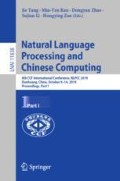Abstract
Existing task-oriented dialogue systems seldom emphasize multi-intent scenarios, which makes them hard to track complex intent switch in a multi-turn dialogue, and even harder to make proactive reactions for the user’s next potential intent. In this paper, we formalize the multi-intent tracking task and introduce a complete set of intent switch modes. Then we propose ISwitch, a system that can handle complex multi-intent dialogue interactions. In this system, we design a gated controller to recognize the current intent, and a proactive mechanism to predict the next potential intent. Based on these, we use pre-defined patterns to generate proper responses. Experiments show that our model can achieve high intent recognition accuracy, and simplify the dialogue process. We also construct and release a new dataset for complex multi-turn multi-intent-switch dialogue.
Access this chapter
Tax calculation will be finalised at checkout
Purchases are for personal use only
References
Bird, S., Klein, E., Loper, E.: Natural Language Processing with Python. O’Reilly Media, Sebastopol (2009)
Cho, K., et al.: Learning phrase representations using RNN encoder-decoder for statistical machine translation. In: EMNLP (2014)
Dernoncourt, F., Lee, J.Y., Szolovits, P.: Neuroner: an easy-to-use program for named-entity recognition based on neural networks. In: EMNLP (2017)
El Asri, L., et al.: Frames: a corpus for adding memory to goal-oriented dialogue systems. In: SIGdial, pp. 207–219 (2017)
Eric, M., Krishnan, L., Charette, F., Manning, C.D.: Key-value retrieval networks for task-oriented dialogue. In: SIGdial, pp. 37–49 (2017)
Hemphill, C.T., Godfrey, J.J., Doddington, G.R.: The ATIS spoken language systems pilot corpus. In: Speech and Natural Language: Proceedings of a Workshop Held at Hidden Valley, Pennsylvania, 24–27 June 1990 (1990)
Henderson, M., Thomson, B., Williams, J.: Dialog state tracking challenge 2 and 3 (2013)
Henderson, M., Thomson, B., Williams, J.D.: The second dialog state tracking challenge. In: SIGDIAL, pp. 263–272 (2014)
Henderson, M., Thomson, B., Young, S.: Word-based dialog state tracking with recurrent neural networks. In: SIGDIAL (2014)
Hinton, G., Vinyals, O., Dean, J.: Distilling the knowledge in a neural network. arXiv preprint arXiv:1503.02531 (2015)
Kingma, D., Ba, J.: Adam: a method for stochastic optimization. In: ICLR (2015)
Lee, K., et al.: An assessment framework for dialport. In: Proceedings of the International Workshop on Spoken Dialogue Systems Technology (2017)
Lee, S., Eskenazi, M.: Recipe for building robust spoken dialog state trackers: dialog state tracking challenge system description. In: SIGDIAL (2013)
Lemon, O., Bracy, A., Gruenstein, A., Peters, S.: The WITAS multi-modal dialogue system I. In: Seventh European Conference on Speech Communication and Technology (2001)
Mrkšić, N., Séaghdha, D.Ó., Wen, T.H., Thomson, B., Young, S.: Neural belief tracker: data-driven dialogue state tracking. In: ACL, vol. 1, pp. 1777–1788 (2017)
Nakano, M., Sato, S., Komatani, K., Matsuyama, K., Funakoshi, K., Okuno, H.G.: A two-stage domain selection framework for extensible multi-domain spoken dialogue systems. In: SIGDIAL (2011)
Price, P.J.: Evaluation of spoken language systems: the ATIS domain. In: Speech and Natural Language: Proceedings of a Workshop Held at Hidden Valley, Pennsylvania, 24–27 June 1990 (1990)
Rayner, M., Lewin, I., Gorrell, G., Boye, J.: Plug and play speech understanding. In: SIGdial Workshop (2001)
Serban, I.V., Sordoni, A., Bengio, Y., Courville, A., Pineau, J.: Building end-to-end dialogue systems using generative hierarchical neural network models. In: AAAI, pp. 3776–3783 (2016)
Sun, K., Chen, L., Zhu, S., Yu, K.: The SJTU system for dialog state tracking challenge 2. In: SIGDIAL (2014)
Sutskever, I., Vinyals, O., Le, Q.V.: Sequence to sequence learning with neural networks. In: NIPS (2014)
Thomson, B., Young, S.: Bayesian update of dialogue state: a POMDP framework for spoken dialogue systems. Comput. Speech Lang. (2010)
Ultes, S., et al.: PyDial: a multi-domain statistical dialogue system toolkit. In: Proceedings of ACL 2017, System Demonstrations
Wen, T.H., et al.: A network-based end-to-end trainable task-oriented dialogue system. In: EACL, vol. 1, pp. 438–449 (2017)
Williams, J., Raux, A., Ramachandran, D., Black, A.: The dialog state tracking challenge. In: SIGDIAL, pp. 404–413 (2013)
Williams, J.D.: Web-style ranking and SLU combination for dialog state tracking. In: SIGDIAL (2014)
Williams, J.D., Asadi, K., Zweig, G.: Hybrid code networks: practical and efficient end-to-end dialog control with supervised and reinforcement learning. In: ACL, vol. 1, pp. 665–677 (2017)
Acknowledgments
Our work is supported by the National Key Research and Development Program of China under Grant No. 2017YFB1002101 and National Natural Science Foundation of China under GrantNo. 61433015.
Author information
Authors and Affiliations
Corresponding author
Editor information
Editors and Affiliations
Rights and permissions
Copyright information
© 2019 Springer Nature Switzerland AG
About this paper
Cite this paper
Shi, C. et al. (2019). We Know What You Will Ask: A Dialogue System for Multi-intent Switch and Prediction. In: Tang, J., Kan, MY., Zhao, D., Li, S., Zan, H. (eds) Natural Language Processing and Chinese Computing. NLPCC 2019. Lecture Notes in Computer Science(), vol 11838. Springer, Cham. https://doi.org/10.1007/978-3-030-32233-5_8
Download citation
DOI: https://doi.org/10.1007/978-3-030-32233-5_8
Published:
Publisher Name: Springer, Cham
Print ISBN: 978-3-030-32232-8
Online ISBN: 978-3-030-32233-5
eBook Packages: Computer ScienceComputer Science (R0)


